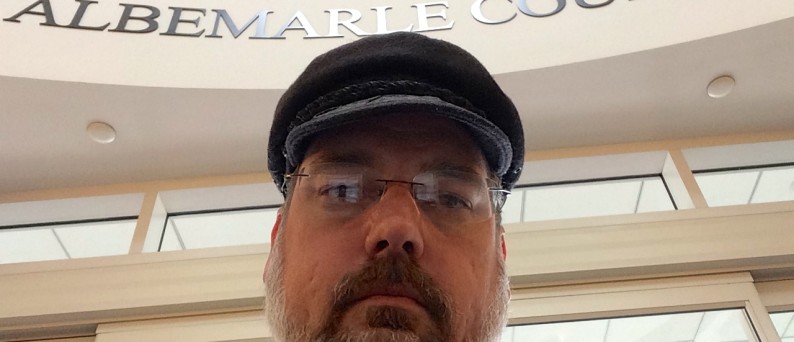 Scott Crawford waiting for accessible transportation at Charlottesville Albemarle Airport.
Scott Crawford waiting for accessible transportation at Charlottesville Albemarle Airport.Transportation is Only as Good as Its Weakest Link
I’m a 50-year-old former clinical neuropsychologist living with progressive multiple sclerosis. Recently, I was called to travel to Washington, D.C., for a meeting with Department of Transportation officials about ways of making air travel easier for people with disabilities. As I always do, I called the Special Service Request line for the airline to be sure they knew that I would be traveling with a 230 lb. power wheelchair. Despite that and reminding the gate agent when I arrived, the ground crew closed the cargo hatch and moved the conveyor away from the plane without loading my chair. It was a good thing I was sitting right there on the tarmac to frantically gesture to them that the chair had to go with me!
Toward the end of the flight, which was uneventful, we started to circle in a way that indicated a problem. Sure enough, Reagan/D.C. National Airport had been shut down due to extremely thick fog, and we were being diverted to Charlottesville, VA. The flight attendant was professional and politely explained that everyone whose final destination was Washington would be given a free ride there, about two hours drive. I reminded him that I needed wheelchair accessible ground transportation. He said that wouldn’t be a problem. I knew better.
Sure enough, everyone else on the flight was promptly transported the rest of the way to D.C. via taxi. An hour went by, and the customer service staff politely reassured me that they’d get me an accessible ride. Then another hour went by, and it was starting to dawn on them that this was no simple task as they’d first thought. Like many cities in America, there are no accessible taxicabs in Charlottesville.
The customer service staff at BOTH the airline and the airport were highly sympathetic and polite, but were shocked to learn that there was no good option for getting me to Washington. One of the men said that there was a private company with an accessible vehicle, but they charged $800 for the two-hour trip. I balked. It was an outrageous amount of money, certainly price gouging in my view. The kind customer service representative said he’d keep trying.
A third hour went by, and I was completely exhausted, and now in pain. My sensation is largely unaffected by MS, so I can only stay seated in my wheelchair about 4-5 hours before it becomes painful on my buttocks. I’ve had decubitus ulcers before, one that took eight years to heal, so pain like that can’t merely be “sucked up” without consequence.
Finally, I gestured to a passer-by to get the agent. I asked, “How much longer?” At that point, he said he’d have to put me up in a hotel and fly me out in the morning. That just wouldn’t do. I needed to be in Washington and rested for the meeting the next day. At that point, I asked if he could find four young and strong individuals to lift the chair into a standard minivan. Luckily, I can still transfer to a seat when necessary. There was more discussion about whether they’d pay to bring me directly to my hotel or only to Reagan/D.C., but I clarified that the delay meant I HAD to cancel my accessible cab at Reagan and that taxis in D.C. require at least three hours lead-time. Getting stranded again at Reagan was just out of the question. I was in way too much pain to sit any longer.
Finally, four people, with my guidance, managed to lift the heavy chair into the back of a minivan. I made it to Washington about five hours late. Luckily the hotel had another four young, able-bodied staff to help unload the chair.
One of the points I always make when presenting about mobility is: “Transportation is only as good as its weakest link”. Usually I’m referring to the lack of accessible bus stops and sidewalks linking the transit system to the surrounding services, housing, and businesses. This was wholly different. Charlottesville Airport and the airline hadn’t thought to check that they had accessible taxis, and as a result, were unable to meet their responsibilities under the Air Carrier Access Act of 1986. Everything is interconnected, and we must strive to think “big picture.”
Scott Crawford, MS
